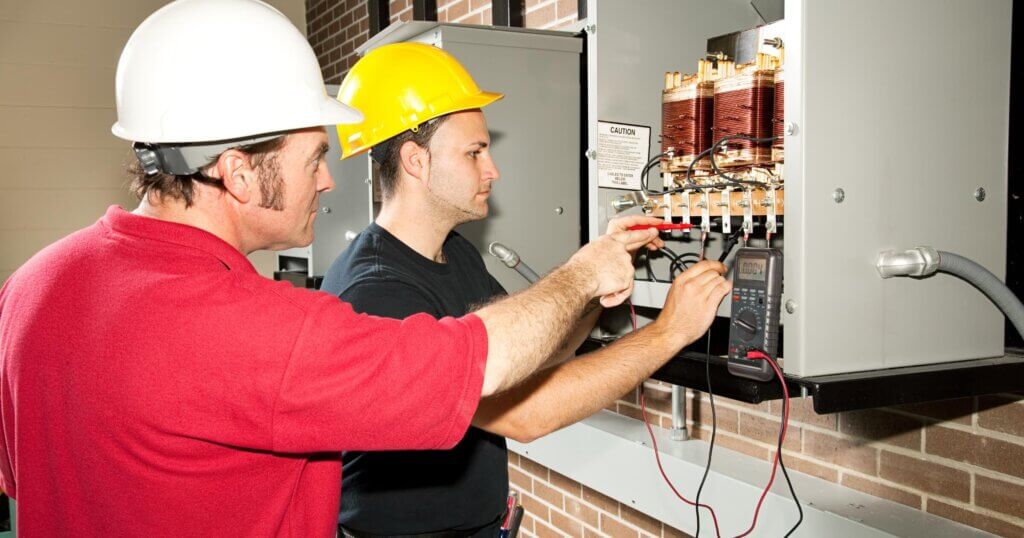Working in the trades is a rewarding career path, and the electrician trade is no exception. Electrical apprentices oversee the experts in their field, learn the basics about electrical theory and safety protocols, and gain hands-on experience while earning a livable wage. Completion of an electrician apprenticeship takes as little as a few years with bachelor’s degree options available to those who want more pay and further education in the field.
This guide will cover how to get an electrician apprenticeship, the requirements needed to become an electrician apprentice, and the best electrician apprenticeship programs in America.
What does an electrician apprentice do
To understand what an electrician apprentice does, it’s important first to understand what a fully qualified electrician does.
Electricians oversee the installation and maintenance of electrical systems wherever required. This includes commercial, industrial, and residential buildings. Electricians must follow regional building regulations and technical diagrams to install or maintain electrical wiring and equipment.
Like many great apprenticeships, electrician apprentices assist the pros in executing this work. They learn safety protocols and electrical theory and help with replacing old equipment, installing lighting, and ensuring the smooth operation of electrical systems.

How much money do electrician apprentices make?
According to ZipRecruiter, electrician apprentices make $23 USD per hour, or $47,449 per year. The high end is $36.06 USD per hour, which is roughly $75,000 per year.
Fully qualified electricians make an average of $34 USD per hour, or $70,880 annually. On the highest end, they could make as much as $51.44 USD per hour, or $107,000 per year.
Salaries may flex depending on your area, but electrician apprentices typically should expect to start at roughly half the fully qualified electrician’s salary. Wages, of course, increase as the apprentice picks up skills and experience.
How to become an electrician in America
There are several pathways to consider to become a certified electrician. The type you choose should depend on your interests and what you’d like to work on most. While “electrician” is a general trade that covers a range of electrical work, there are ways to niche down in the industry that offer more pay longterm.
Types of electrician jobs to consider
General
General electricians may work for a business that specializes in specific sectors, including:
- Residential
- Commercial
- Industrial
- Lineworker
- Maintenance
Specialized
Some industries require electricians who specialize in skills pertaining to their industry. They may have equipment that requires additional electrical training or use technology beyond the scope of a general electrician. These fields could include:
- Avionics
- Marine
- Wind turbine
- Solar panel
The requirements needed to become an electrician apprentice
The journey to becoming a first-year apprentice begins in high school. Before getting into an apprenticeship program, you’ll need your high school diploma or GED. Additionally, you need to be at least 18 years old before you get started.
While there are no concrete physical requirements, it’s also required that you’re physically capable and comfortable doing the job. You’ll need to be sure you’re comfortable working at heights, below ground level, and in tight or dark spaces.
Before beginning some apprenticeships, you might be required to take an aptitude test. Some programs are flexible and work around the students’ schedules and experience levels, but some programs are a little more rigid in their curriculum. On-the-job and in-the-lab training need to be pre-planned and pre-scheduled to ensure that every student gets the experience they need.
How long does an electrician apprenticeship take, and what does it cost?
The time it takes to complete an electrical apprenticeship varies between programs, but generally you can expect to spend four to six years training. Some of that time will be spent in a classroom, but some will involve in-the-field training.
Student apprentices spend a significant amount of upfront time observing electricians at work and getting an understanding of the job and typical duties. You’ll learn by taking in knowledge from the experts and will quickly master best practices before carrying out more hands-on duties.
The training cost also varies. Some programs at universities or colleges will charge tuition per year, per semester, or as a hefty one-time fee before you start. This can range from a few hundred to a few thousand dollars. If you go the longer route and get a bachelor’s or associate’s degree, you can expect to pay thousands more than the typical trades program.
Do keep in mind, though, that apprentices are paid for their work in the field, so sometimes, your wage can offset a bit of the cost of your education and pay for itself in the long run.
Best electrician apprenticeship programs
America has some of the most reputable apprenticeship programs around, and there could be many excellent electrician apprenticeships near you today. Before you sign up for one, consider location, time commitment, and whether or not that program partners with local businesses to smooth the transition to the field.

You should also consider whether the program offers in-the-field and in-class training and what the curriculum covers. Covering the basics is great, but programs that cover more theory and niche technical skills could help you excel in your career down the line. Examples of reputable, all-encompassing programs include:
- The National Institute of Technology’s Electrical Technician Training Program
- The Independent Electrical Contractor’s Apprenticeship Program
- Lincoln Technology’s Electrical Program
- Penn Foster’s Residential Electrician Program
- UEI’s Electrician Technician Training Program
Is an electrician career right for you?
A career as an electrician can be satisfying, rewarding, and quite lucrative for those who venture down that path. It all starts with an apprenticeship, where students learn in class and in the field about electrical theory, lighting installation, and maintenance.
If you’re okay with tight spaces, working underground, or at great heights, it just might be the job for you. Schooling could take a few years, but the wage you make while you learn is always a great help. Before you know it, you’ll have mastered the craft and carved your space in a long-term career.
To stay updated with apprenticeships in the AEC space, subscribe to the newsletter and follow us on LinkedIn.



2 comments